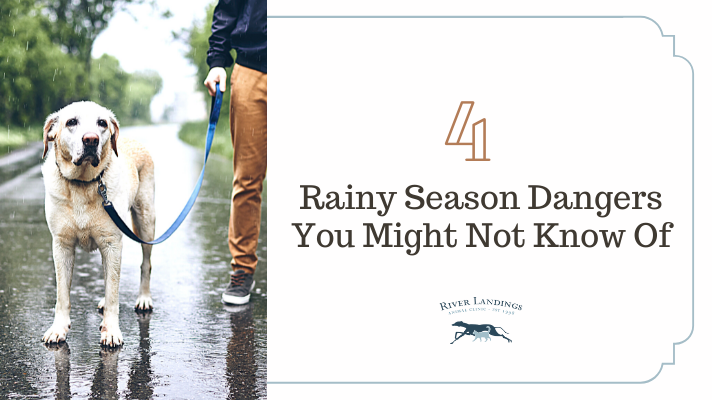Each year, certain parts of North America are bombarded with rain. While this may be good for the garden, high rainfall can potentially pose some real threats to your dog.
1. Mushrooms
During the rainy season, mushrooms may pop up in your yard with more frequency. There are thousands of species of mushrooms, but thankfully only about 100 are poisonous. That said, mushroom identification is very difficult, so it's hard to tell which are poisonous versus which are benign. As a result, whenever you see mushrooms growing in your yard, make sure to remove them immediately and throw them away to prevent accidental ingestion by your dog. If your dog does get into a mushroom, contact your veterinarian immediately about inducing vomiting to get any potential toxin out.
Certain types of mushrooms may cause organ injury including:
Gastrointestinal injury (signs include drooling, not eating, vomiting, diarrhea)
Liver linjury (signs include vomiting, black tarry stool, yellow skin)
Kidney injury (signs include abnormal urination and thirst)
Cardiovascular injury (signs include a very slow or rapid heart rate)
Neurologic injury (signs include hallucinations, tremors, seizures)
When in doubt, get to your veterinarian immediately as it's easier - and less expensive - to treat early on versus once clinical signs have developed.
2. Leptospirosis
Leptospirosis, a bacteria-like spirochete, is carried naturally by wildlife, like rodents and raccoons. In high rainfall situations, it’s prevalent in the environment. In dogs that have exposure to water sources, contaminated by wildlife urine (puddles, streams, ponds, etc.), transmission can occur. Canine leptospirosis can result in liver injury and acute kidney injury.
Signs of leptospirosis include:
Vomiting
Not eating
Malaise
Yellow skin
Excessive thirst
Urination
As leptospirosis can accidentally be transmitted to humans, it's important to talk to your veterinarian about prevention, including vaccines.
3. Mosquitoes
While mosquitoes may seem like just a pesky insect to you, they can be life-threatening to your dog. That's because mosquitoes can carry Dirofilaria, which transmits heartworm infection to your dog. Thankfully, there is a very effective preventative in either a topical or oral form. When in doubt, use year-round control to prevent problems from mosquitoes. If your dog has thin fur or skin and is more predisposed to getting bitten, use Skin So Soft or a topical insect repellent that repels mosquitoes. Talk to your veterinarian to be safe before applying anything.
Click here to learn more about heartworm disease in dogs.
4. Toads and frogs
Depending on where you live in the United States, certain types of toads - specifically the Bufo marinus or Bufo alvarius - can be poisonous to dogs. In fact, a dog drinking water from an outside dog bowl, that had a poisonous toad sitting in it, can result in clinical signs of:
drooling
panting
walking drunk
a racing heart rate
a very slow heart rate
even seizures
Frogs are not toxic, but can cause gastrointestinal upset when ingested.
To be safe, supervise your dog outside to prevent accidental ingestion of dangers like toads and frogs. When in doubt, contact your veterinarian or ASPCA Animal Poison Control Center at 888-426-4435 if you think your dog is ill or could have ingested something poisonous.
If you have any questions or concerns, you should always visit or call your veterinarian -- they are your best resource to ensure the health and well-being of your pets.
Hear From Us Again
Don't forget to subscribe to our email newsletter for more recipes, articles, and clinic updates delivered straight to your e-mail inbox.
Related Categories:



